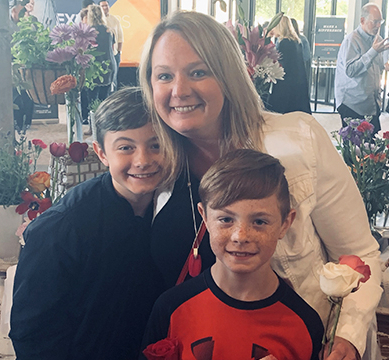 With more of our interactions than ever happening in a virtual meeting room, are you truly listening? And if you are, at what level are you listening, as a leader?
With more of our interactions than ever happening in a virtual meeting room, are you truly listening? And if you are, at what level are you listening, as a leader?
Empathetic listening is an essential component of influential leadership—it fosters better connections, supportive relationships and increased commitment.
Not only does listening require a willingness to listen, but also understanding of both the spoken and unspoken messages, as well as active engagement with the speaker’s opinions and ideas.
If you’ve made a practice of simply not speaking while listening, or parroting back the speaker’s points, it’s time to redefine what good listening looks like.
Listening in a Zoom Office World
Previously, our multi-tasking technology was one of the distractions that made listening more difficult in the workplace. Now, technology has become the workplace itself.
As we conduct most of our group conversations online, we are more inclined than ever to zone out, whilst active listening is even more important to meeting cohesion.
According to Sarah Gershman in Harvard Business Review, President of Green Room Speakers, within a virtual meeting, we are especially subject to the “Ringelmann effect” – the bigger the group for a task, the less responsibility each person feels in making the effort a success and the less personal effort each exerts.
While this effect occurs in an in-person meeting too, the online office amplifies the tendencies to tune out and talk over each other. Whether leading the meeting, one of many participants or engaged in a one-on-one, your quality of listening still matters.
Strategies for doing your part in creating meeting cohesion include:
- Before signing in, consider what value your participation holds for you and the group.
- Reiterate previous points before introducing a new topic so others know they were heard.
- Listen for and see themes raised by multiple speakers, asking reflective questions.
- Note down peripheral thoughts that pop into your head, bring your attention back.
- If you get distracted, acknowledge you lost the thread with a clarifying question.
Good Listening = A Conversation That Elevates
In Harvard Business Review, co-researchers Jack Zenger (CEO) and Joseph Folkman (President) of Zenger/Folkman, assert that good listening is not what most people think: simply not talking over others, making affirming facial expressions and sounds, and repeating back what was heard.
While it’s also not a ping-pong of contrasting viewpoints or oneupmanship stories, zipping your lips is not the golden standard of listening.
Rather, the researchers found that great listening experiences feel like an elevating conversation. The best listeners are more like “trampolines” than “sponges.”
“They are someone you can bounce ideas off of — and rather than absorbing your ideas and energy, they amplify, energize, and clarify your thinking,” writes Zenger and Folkman. “They make you feel better not merely passively absorbing, but by actively supporting. This lets you gain energy and height, just like someone jumping on a trampoline.”
Qualities of a Good Listening Experience
The researchers found these core components of good listening experiences.
Good Listening:
- Becomes a dialogue: Exceptional listeners comprehend the speaker so well they can ask occasional constructive questions that carefully challenge assumptions that expand the conversation. So rather than being a one-way interaction, the listener enables the speaker to explore and share more.
- Is supportive, permissive and builds self-esteem: Neither passive nor critical listening is enough. When a listener creates an environment that is safe for open discussion, regardless of the issue or differences, the speaker gains confidence and feels supported and positive about the experience of being heard.
- Is cooperative, not competitive: In the best conversations, neither speaker nor listener becomes defensive as the conversation flows, even when assumptions are challenged. But if the listener highjacks the conversation to focus on making their own points or winning an argument rather than supporting exploration of the speaker’s viewpoints, the connection unravels.
- Opens up the conversation with suggestions: While people often feel they aren’t listened to when the listener jumps to fix their problem through suggestions, the researchers also found that exceptional listeners do make suggestions—skillfully—- that “opened up alternative paths to consider.”
Leveling Up as a Listener
A good listener doesn’t have an agenda—instead, park your own needs, wants and self-concept. Mistake one can be to self-identify as a good listener. Instead, take ‘yourself’ out of the way.
You can skill up by asking yourself these questions, related to levels of listening, which may also lay the trust foundation for making suggestions:
- Are you creating a safe environment to bring up complex and emotional discussions?
- Are you clearing away distractions to help bring your focused attention to the conversation?
- Are you seeking to understand the substance of what is shared, and clarifying with the speaker to confirm that you do?
- Are you listening to the 80% of communication that comes from nonverbal cues such as posture, facial expressions, eyes, gestures, breathing, energy, tone? (even more challenging over a screen)
- Are you grasping the emotions and feelings at play from the speaker’s perspective, and are you acknowledging without judging and validating them with empathy?
- If doing all of the above, are you able to ask the questions that clarify assumptions and help the speaker to consider the topic in a way that is expansive?
Extra Tips From Listening Leaders
According to Enterprisers Project on being a better listener, CEO Chris Kachris of InAccel suggests to take a page from reflective parenting: “Don’t try to reject or beautify their concerns, their stress, and their worries. Don’t try to convince about your opinion without first understanding their worries.”
Dr. Bahiyyah Moon, president and chief data officer of Polis Institute, advises, “The most important rule of listening is the 3-1 ratio. Listen three times longer than you talk. The next rule is to ask more than you respond. Typically people have a comment after another person speaks. Great leaders follow up with questions.”
Ed Jaffe, founder of Demo Solutions, shares, “It is not just listening, it is trying to see the problem from the side of someone else, and understand why they are saying it. You do not have to validate the idea, but you must validate the person.”
“Listening is the key to asking the right questions” says Nicki Gilmour, the head coach of Evolved People Coaching and Founder of theglasshammer.com. “Tuning in to people requires hearing not just the content of what they are saying, but listening for the meta messages of what is really going on to help people identify what really matters.”
Ultimately, leveling up your listening can only create better connections, and enable you to become a more empathetic and expansive leader.
By Aimee Hansen


